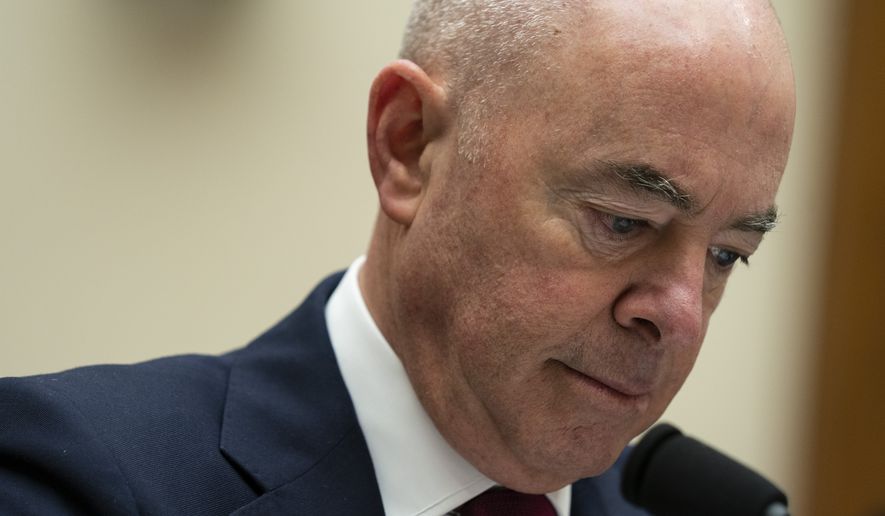Homeland Security Secretary Alejandro Mayorkas has put the final kibosh on his disinformation governance board, which never recovered from a botched rollout in the spring.
The department announced the board’s demise hours after the Homeland Security Advisory Council voted unanimously to adopt a report saying the board wasn’t necessary to fulfill the department’s mission.
“In accordance with the HSAC’s prior recommendation, Secretary of Homeland Security Alejandro N. Mayorkas has terminated the Disinformation Governance Board and rescinded its charter effective today, August 24, 2022,” the department said late Wednesday.
Critics said the fact that Mr. Mayorkas entertained the idea at all was troubling.
“The administration is finally acquiescing to our repeated calls to terminate the Disinformation Governance Board at the Department of Homeland Security,” said Sen. Rob Portman of Ohio, the top Republican on the Senate committee that oversees Mr. Mayorkas. “I remain concerned by the idea that the United States government would turn the tools that we have used to assist our allies to counter foreign adversaries onto the American people.”
He said the department also needs to answer questions about the board’s activities during its short time in operation.
Mr. Mayorkas announced the board in late April. He told members of Congress that it would help police disinformation aimed at minority communities.
The department then revealed that the board would be headed by Nina Jankowicz, a researcher at the Wilson Center whom Mr. Mayorkas termed an expert on disinformation — but who had a history of spreading dodgy claims.
Critics called the board Orwellian and questioned its purview.
The department backtracked, saying the board was intended to police current efforts to combat foreign disinformation and would ensure Homeland Security was maintaining civil liberties.
Internal documents obtained by Sens. Chuck Grassley, Iowa Republican, and Josh Hawley, Missouri Republican, showed that the board sought to work with technology companies and was interested in policing narratives about the COVID-19 pandemic or U.S. elections.
The board proved to be a “highly unpopular” idea, according to polling conducted in the spring.
A TIPP Insights survey found that 55% of those closely following the debate disliked the idea of the board, including 32% who said they had “no trust at all” in Homeland Security’s ability to decide what constitutes disinformation.
Facing those headwinds, Mr. Mayorkas put the board on hold and ordered the advisory council to report on the next move.
On Wednesday, the council unanimously adopted a recommendation by former Homeland Security Secretary Michael Chertoff and former Deputy Attorney General Jamie Gorelick to dissolve the board.
Although Homeland Security should play a role in combating misinformation, the report said, it should build on current programs and not create a central policing outfit.
“They don’t have a red pencil to correct everything in the world that’s not true,” Mr. Chertoff said.
Chad Wolf, who served as acting homeland security secretary in the Trump administration, said the idea of the board was bad from the start.
“The amount of discredit that that brought to the department, it’s unbelievable that they would go down that route,” he told The Washington Times ahead of Mr. Mayorkas’ final decision.
He said the department already battles disinformation, but it’s from “a foreign perspective.” He said component agencies, such as Customs and Border Protection, counter smuggling cartels’ messages to would-be migrants.
“You don’t put it in the secretary’s office to then start looking at disinformation here domestically. Because then you get into free speech, you get into a lot of different issues you want to stay away from,” he said. “If you do find information out there that’s disconcerting, you can address it one-off. You don’t need a disinformation board with a lunatic at its head.”
Ms. Jankowiz didn’t respond to an inquiry Thursday from The Times on the board’s demise. On Twitter this week, she rejected suggestions that she has been damaged by the flap.
“People continue to write government fan fiction that describes me as ‘disgraced.’ But here in the real world … my books are selling, my calendar is full, my work continues (on which more soon),” she wrote.
Mr. Chertoff and Ms. Gorelick said in their report that the department should limit its disinformation efforts to core homeland security missions.
As examples, they cited CBP’s efforts against smuggling cartels and the Federal Emergency Management Agency’s attempts to combat misinformation about emergency services during disasters.
They said the word “disinformation” often sparks intense reactions, but Mr. Chertoff said, “It was our sense that the actual work of the department has been exaggerated, and the real work is extremely straightforward.”
He and Ms. Gorelick said the department should also follow basic principles: communicate what it’s doing, make sure the communication is conveyed in plain language and explain to the public “the importance of truth.”
The report also urged the department’s legal offices to take an active interest in how agencies are making sure civil liberties are respected.
• Stephen Dinan can be reached at sdinan@washingtontimes.com.




Please read our comment policy before commenting.